Globalization and Issues for Achieving the SDGs in Africa Discussed at TICAD7 Partner Event Featuring Nobel Laureate Joseph Stiglitz
2019.09.11
On Aug. 27, 2019, TICAD7 Partner Event: Globalization and Achieving the SDGs in Africa, Discussion with Professor Joseph Stiglitz, a seminar jointly organized by Meiji University, the Initiative for Policy Dialogue (IPD) based at Columbia University, and JICA Research Institute (JICA-RI), was held at Meiji University.
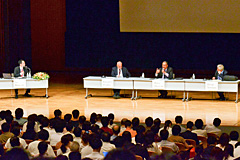
JICA-RI Visiting Scholar Go Shimada served as the moderator for the panel discussion
Disparities among countries and within countries have been expanding with increasing globalization. This seminar particularly looked at how Africa is being impacted by globalization and how Africa will develop under future conditions.
At the beginning of the seminar, Professor Keiichiro Tsuchiya, president of Meiji University, remarked “how we solve issues that follow economic development like environmental and climate changes is important. Through discussions on Africa, I hope this seminar serves as an opportunity to think about the direction Japan needs to move into.” Next, Yasuo Fujita, deputy director of JICA-RI, gave opening remarks and mentioned about a joint research project ongoing between IPD, led by Nobel laureate Professor Joseph E. Stiglitz at Columbia University, and JICA-RI, since 2008. He also said he believes that the three books and the latest publication, “The Quality of Growth in Africa,” published as outcomes of the joint research project, will serve as guidelines for those working in development and for JICA’s operations and research activities to solve issues in Africa.
In the keynote, Stiglitz discussed the need of new ways of thinking for development and economic growth in Africa from various angles. For instance, as “labor-replacing” technological innovations like AI, cryptocurrency and SNS have progressed, export-led manufacturing models that brought economic growth in East Asia in the past would not work in the same way in Africa today. Moreover, he said that labor-augmenting innovation and learning (learning to enhance the capacities of producers) are required to lessen the gap between developed nations and developing nations, and are the sources of economic development in Africa. Furthermore, as in the Stockholm Statement of 2016, he said that GDP growth itself is not the objective in the first place and success should not be measured exclusively by economic benchmarks like GDP. He emphasized rather that we need to focus on the “quality of growth” contributing to human capital, social capital and knowledge capital.
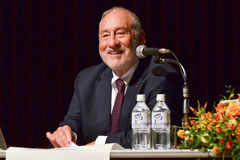
Professor Joseph E. Stiglitz at Columbia University delivered the keynote speech
The keynote lecture slides by Stiglitz can be viewed at the below link.
In the panel discussion that followed, Hafez Ghanem, vice president of the World Bank for Africa, and Professor Akbar Noman at Columbia University were welcomed as panelists. Go Shimada, associate professor of the School of Information and Communication, Meiji University, who is also a visiting scholar at JICA-RI, served as the moderator.
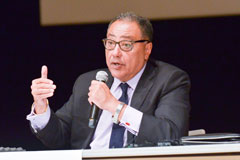
Hafez Ghanem, vice president of the World Bank for Africa
Ghanem gave positive views on Africa being “the last frontier” significantly abundant in natural resources. He pointed out that investments in human resources, education, gender issues and health are extremely important, considering that two-thirds of the total population are under the age of 25. While pointing out the potential of technology in making significant contributions to addressing key issues like job creation and eliminating corruption, Ghanem also mentioned how it is surprising that the cost of internet usage in Dakar, Senegal, is roughly two-fold that in Washington DC. He said that it is necessary to create public platforms to develop appropriate competition policies and reduce inequality.
Noman stressed the need for industrial policies in a broad sense, covering environmental and employment-related issues, to ensure high quality growth. For instance, he mentioned that the development of climate-change-mitigating technologies has the potential to cause a technological leapfrog in Africa. Based on the lessons from leading cases around the world, he expressed his hopes in learning, industrial, and technology (LIT) policies bringing about a kind of structural transformation needed for generating sustainable growth.
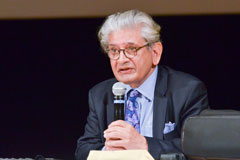
Professor Akbar Noman at Columbia University
Professor Takehiko Daikoku, dean of the School of Information and Communication, Meiji University gave closing remarks to wrap up this seminar that has provided an invaluable opportunity to have discussions with leading experts like Stiglitz here in Japan.
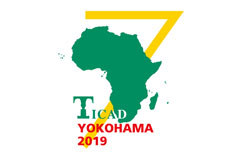

事業事前評価表(地球規模課題対応国際科学技術協力(SATREPS)).国際協力機構 地球環境部 . 防災第一チーム. 1.案件名.国 名: フィリピン共和国.

事業事前評価表(地球規模課題対応国際科学技術協力(SATREPS)).国際協力機構 地球環境部 . 防災第一チーム. 1.案件名.国 名: フィリピン共和国.

事業事前評価表(地球規模課題対応国際科学技術協力(SATREPS)).国際協力機構 地球環境部 . 防災第一チーム. 1.案件名.国 名: フィリピン共和国.

事業事前評価表(地球規模課題対応国際科学技術協力(SATREPS)).国際協力機構 地球環境部 . 防災第一チーム. 1.案件名.国 名: フィリピン共和国.

事業事前評価表(地球規模課題対応国際科学技術協力(SATREPS)).国際協力機構 地球環境部 . 防災第一チーム. 1.案件名.国 名: フィリピン共和国.
scroll